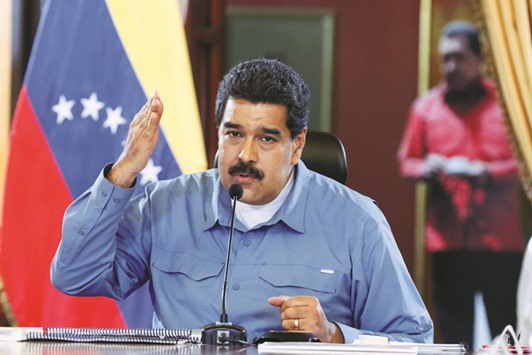Citibank plans to close the account Venezuela uses to make international payments, President Nicolas Maduro said, accusing the US-based bank of mounting a “financial blockade.”
“Citibank, with no warning or communication, says that it is going to close the Central Bank and Bank Of Venezuela account. That is what you call a financial blockade,” the embattled president said in televised remarks.
He said the move amounted to an “inquisition” by US President Barack Obama’s administration.
Citibank confirmed the decision yesterday, saying it was “following a periodic risk management review,” without explaining what that review found about its operations related to the deeply troubled Venezuelan economy.
Maduro said his South American nation, a major oil producer, uses the account to make payments “within 24 hours, to other accounts in the US and worldwide.”
Maduro’s socialist government has often claimed that US interests and local business elites were trying to undermine his state-led economy and prevent Venezuela’s access to international credit.
“Do you think they are going to stop us by putting in place a financial blockade? No, ladies and gentlemen, nobody stops Venezuela! With Citibank or without it, we are moving forward.”
Venezuela’s government said just hours earlier that it would take over operations at facilities where US consumer goods giant Kimberly-Clark recently shut down, citing unworkable economic conditions.
The American company announced on Saturday it would cease production, saying that it was impossible to get enough hard currency to buy raw materials, and that inflation was surging.
“We are going to sign, at the workers’ request...to authorise immediate occupation of the workplace known as Kimberly-Clark de Venezuela... by its workers,” Labor Minister Oswaldo Vera said at the facility’s plant in the central city of Maracay.
The country’s economy has been hard hit by the plunging value of its main export, oil.
Analysts also criticise its state-led economy of gross mismanagement leading to shortages of food and basic goods such as toilet paper and diapers.
Vera, signing the document to loud cheers, said machines would be back in operation within hours.
Maduro also announced he and Defence Minister Vladimir Padrino were leading a new plan to reverse the severe shortages of basic goods in the country.
“All control of supply in the county is in my hands and the hands of Padrino,” Maduro said, adding that other ministers would answer to the “presidential command” of the “civic-military union.”
The project would concentrate on efficient production of commodities and new ways for distributing basics such as food and medicine.
In a sign of Maduro’s concern at mounting social unrest, the president on Thursday replaced the head of the National Guard.
The Venezuelan opposition launched efforts to remove the president via a referendum after winning control of the legislature in January.
But Maduro has challenged his rivals through the Supreme Court, which the opposition claims he controls. The government has already filed a case in the court against the referendum bid.
The national electoral board has said it will announce by July 26 whether enough signatures have been authenticated in an initial petition calling for the recall referendum.
If that happens, Maduro’s opponents must, in the next stage of the months-long process, collect 4mn more signatures to call a full referendum on his removal.
The opposition is rushing to complete the recall process by January 10, the cutoff date to trigger new elections. After that date, a successful recall vote would simply hand power to Maduro’s hand-picked vice president.

President Nicolas Maduro
